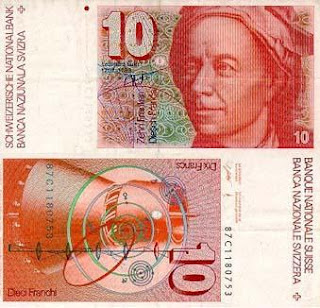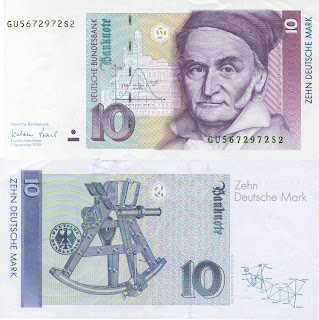
Archimedes of Syracuse: born 287 BC, died 212 BC. The greatest thinker of antiquity. Known for inventions for centuries, including weapons he developed for his relative King Hieron of Syracuse and a famous method for irrigation called the Archimedes Screw, still used to this day, he was proudest of the mathematics he did, and asked for one of his discoveries, the relation between a cylinder and a sphere inscribed in it, to be put on his tomb. There are three famous stories about him that include quotes.
"Eureka!": King Hieron was given a gift of a gold crown, but he wanted to make certain it was really gold without melting it down. He asked Archimedes if he could come up with a test. Archimedes has in his bathtub when he saw the level of the water rose when he entered, and thought about why a large boat would float while a small rock would sink. He came up with the laws of displacement and realized it could be used to see if the crown was really gold or just another metal with gold plating. He was so excited by this, he ran through the streets of Syracuse to the palace of the king naked, yelling "Eureka!" which means "I have found it!"
"Give me a lever and a place to stand and I could move the earth.": Archimedes challenged a mighty warrior to move a massive stone brought to the palace. The warrior could not, but Archimedes took a long piece of wood, and using a small rock as the fulcrum, he was able to move the large weight using leverage. Many of his inventions used leverage, either directly like a lever and fulcrum or indirectly like turning screw.

"Don't disturb my circles!": The Roman general Marcellus was invading Sicily and laid siege to Syracuse. He gave specific orders that Archimedes was to be captured and brought to him alive. With the battle raging in the city, Archimedes, then in his seventies, was working hard on a geometry problem and paid no attention to the clamor around him. A soldier burst into his home and found him on his patio working on math. Archimedes did not notice the soldier until the man's shadow cast on the work Archimedes was doing, and when that happened, Archimedes spoke sharply at the young man. "Don't disturb my circles!" the old man snapped, and the soldier, unhappy with the disrespect, stabbed and killed Archimedes. Marcellus was very upset by this, and paid for lavish tomb to be built for the great inventor, with the cylinder and sphere put on top of it.
As great as his reputation has been for more than two thousand years, Archimedes had a new work "discovered" in the 20th Century, when an illuminated prayer book from the 10th Century was discovered to be a palimpsest of one of Archimedes' lost works, which is a book written over the paper of another book. This work shows that he understood the basic concepts of integral calculus, a field of study not fully understood by the rest of mankind until our next great mathematician comes along.
 Sir Isaac Newton: born 1642, died 1727. Born in England prematurely on Christmas day, 1642, Newton's father was quoted as saying that Isaac could fit in a pint mug when he was born. His father died soon after and his mother re-married, and the family struggled to make ends meet. Newton's cleverness showed itself early as he designed toys for himself that actually worked, like a toy wagon whose wheels turned and whose axle could be steered. The owner of the land on which Newton's father worked decided to sponsor the boy to go to Cambridge, which was then and is still now one of Britain's great universities. Late in his studies in 1666, plague swept through Europe and the universities were closed. Alone on the farm from 1666 to 1669, Newton did much of the great work of his life, including the three laws of motion, the laws of optics, the laws of universal gravitation and the mathematics behind it all, integral and differential calculus. For this, he is considered the father of modern physics.
Sir Isaac Newton: born 1642, died 1727. Born in England prematurely on Christmas day, 1642, Newton's father was quoted as saying that Isaac could fit in a pint mug when he was born. His father died soon after and his mother re-married, and the family struggled to make ends meet. Newton's cleverness showed itself early as he designed toys for himself that actually worked, like a toy wagon whose wheels turned and whose axle could be steered. The owner of the land on which Newton's father worked decided to sponsor the boy to go to Cambridge, which was then and is still now one of Britain's great universities. Late in his studies in 1666, plague swept through Europe and the universities were closed. Alone on the farm from 1666 to 1669, Newton did much of the great work of his life, including the three laws of motion, the laws of optics, the laws of universal gravitation and the mathematics behind it all, integral and differential calculus. For this, he is considered the father of modern physics.For all his talent at theoretical work, Newton was also a practical man. He invented the reflecting telescope, the kind that you find at large observatories. He was knighted for his work at the Royal Mint, where he developed ways to catch makers of counterfeit coins.
Personally, he was very shy, and there is some speculation that he had a mild form of autism known as Asperger's Syndrome. He would rock back and forth when in intense concentration and disliked being touched. He wrote to a friend that he was proud and happy that he would die a virgin.
While his great work was finished by 1670, Newton did not like dealing with people and had to be coaxed into publishing his findings, which he finally did in 1687 in a book called the Principia Mathematica, short in Latin for the mathematical principles of physics. While the book had its detractors, soon enough the world saw how important a work it was, and Newton's became world famous.
He actually spent much more time studying the Bible and alchemy than he spent on math, but he never published these other works. Some of his religious scholarship was heretical at the time, like his proof that the Holy Trinity was physically impossible, and his calculations that the end of the world prophesized in the Bible would come in 2060 was only written in a letter to a close friend.

Leonhard Euler: born 1707, died1783: Leonhard Euler (pronounced Leonard Oiler) was born in Switzerland. His talent at math was seen at an early age and he became fast friends with the Bernoulli family, a famous few generations of Swiss scientists. He became renowned in his time as the greatest mind of his generation, and worked for both Frederich the Great of Prussia and Catherine the Great of Russia. He is a close contemporary of Ben Franklin (1706-1790), but his reputation as a scientist is much greater. He fathered 13 children, only 5 survived infancy. His first wife died and he married her sister. He went blind, but kept working until he died. In these situations, Euler has parallels with the life of the great German composer Johann Sebastian Bach (1685-1750).
His reputation during his life was very strong. The French mathematician and astronomer Pierre-Simon LaPlace wrote to his students, "Study Euler, for he is the master of us all." His place in history faded somewhat, but there was a strong comeback after all his works were finally published in a single place, 80 quarto volumes of math. (A quarto volume is about the size of a phone book.)
There are so many mathematical ideas that he pioneered, if all of them were named after him the confusion would be too great.A famous function sometimes known as the Riemann zeta function is now more accurately called the Euler-Riemann zeta function. Riemann was alive about a century later than Euler.
The base of natural logs, a very important number in calculus, is named e in honor of Euler, who did a lot of work with the number.

Carl Friedrich Gauss, born 1777, died 1855. When Gauss was born, Germany did not exist, but that is the country that now includes his home region of Brunswick. Gauss was the greatest mathematician in the first half of 19th Century. Like Newton, he wasn't rich, but the Duke of Brunswick became his mentor, and out of respect, he went to the University of Gottingen instead of the most important university in the German speaking work, the University of Berlin. Because he went there and stayed there and his best students stayed there, Gottingen became one of the top math schools in the world until it was destroyed by Nazi policies in 1933.
There is a famous story of him showing his math skills while very young. His class was being noisy, so his teacher told all the students they had to add the numbers 1 through 100 and find the sum. In less than a minute, little Carl raised his hand and gave the correct answer: 5,050.
He had his practical side as well. He is credited with inventing the telegraph and had a working model before Samuel Morse got a patent in the United States. He worked as a surveyor and an astronomer. He "re-found" the largest asteroid between Mars and Jupiter mathematically after a Sicilian astronomer found it and gave several sightings but lost it. He did it solving a difficult equation and didn't tell anyone his method. He was accused of witchcraft.
In his lifetime, Gauss' reputation was so great that when Napoleon conquered most of Europe and imposed a tax on all professors at all schools in conquered territories, the French Academy paid Gauss' tax.

No comments:
Post a Comment